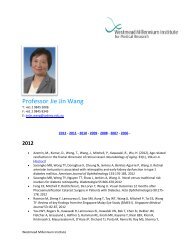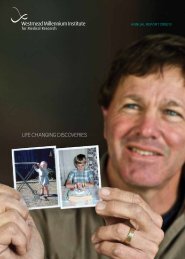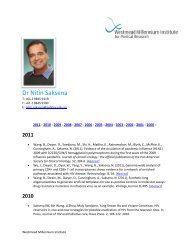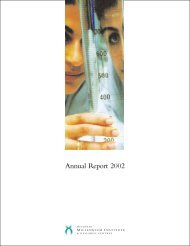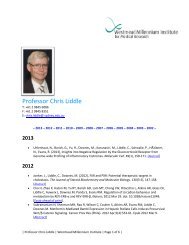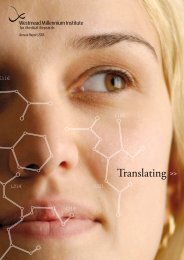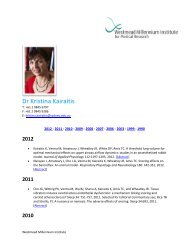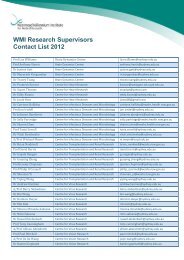Annual Report 2005 - Westmead Millennium Institute
Annual Report 2005 - Westmead Millennium Institute
Annual Report 2005 - Westmead Millennium Institute
Create successful ePaper yourself
Turn your PDF publications into a flip-book with our unique Google optimized e-Paper software.
Director’s <strong>Report</strong>This year, Australian researchexcellence was recognisedwith a major commendationto exceptional medicalresearchers with the awardingof Australia’s fifth NobelPrize for Medicine to BarryMarshall and Robin Warrenfor their groundbreakingdiscovery that the bacteriumhelicobactus pylori causespeptic ulcers.This deserving award highlights the respect granted to Australianmedical research both locally and internationally. We are amongstthe best in the world, and much of that success is upheld bypositive community support and strong partnerships betweenhospitals, universities and biomedical research institutes.<strong>Westmead</strong> <strong>Millennium</strong> <strong>Institute</strong> (WMI) has such a partnership withSydney West Area Health Service and the University of Sydney,and we honour these alliances by including for the first time amessage from our partners in our annual report. This partnership,and our collaborations with our neighbouring institutions in the<strong>Westmead</strong> Research Hub, has underpinned our increasingsuccess and allowed us to emphasise our translational researchphilosophy - lab bench to bedside research.As with previous years, WMI continued to expand in size,productivity and research success. WMI received 13 NHMRCproject grants, two ARC Linkage and Discovery Grants, and oneProgram Grant led by Prof Rick Kefford for much needed researchinto melanoma. This year also saw breast cancer researcher A/ProfChristine Clarke establishing Australia’s first comprehensive breastcancer tissue bank in association with other leading researchersand clinicians from around NSW. Professors Neil Hunter and NickJacques from the <strong>Institute</strong> for Dental Research also received highlyprestigious funding from the National <strong>Institute</strong>s of Health USA,for research into the bacteria causing dental caries.Our senior professors and research group leaders continue toattract numerous invitations to present at the leading internationalconferences in their disciplines. The success of the youngergeneration of researchers within the <strong>Institute</strong> has also beenrecognised through University promotions including ProfessorsChris Liddle, Jacob George and Associate Professor Graham Mann.This year there have been substantial changes in the <strong>Institute</strong>with re-organisation into five research divisions of infectiousdiseases and immunology, cancer and leukaemia, liver andmetabolic diseases, neuroscience and vision and cardiorespiratory,and the admission of three large new centres.Postgraduate students are the lifeblood of most researchinstitutions, bringing youthful energy and enthusiasm to the<strong>Institute</strong>. I am proud to report that over the past five years thenumber of research students at WMI has more than doubled.We now support over 100 PhD, Masters and Honours studentsdrawn mostly from the University of Sydney, but also from manyother universities around the state.Despite the high morale and productivity within the <strong>Institute</strong> we stillface a number of key issues. Our remarkable growth has placedimmense strain on research space and this has impairedrecruitment of senior staff and students. Whilst we are recognisedas being one of the best by our scientific peers, the significantcapital funding required for building expansion cannot be achievedthrough competitive peer reviewed grants. The solution dependsupon the support of the State and Commonwealth governments,universities and private philanthropy. Whilst all groups havedisplayed enthusiasm for supporting medical research, muchneeds to be done in order to bring New South Wales into line withVictoria, Queensland and Western Australia. Approval for the NSWStrategic Plan for Medical Research would provide this muchneeded capital funding.The other great challenge facing the <strong>Institute</strong> is the effectivetranslation and commercialisation of its research intobiotechnology. The formation of Biolink, a State commercialisationenterprise will assist us in educating and supporting ourresearchers and we are starting to see the fruits of our recentefforts to improve commercialisation of research at <strong>Westmead</strong>.I would like to thank both the Chairman of our Advisory BoardMr Paul Bell, and the outgoing President of the The <strong>Millennium</strong>Foundation Mr James Wakim, for their admirable work in raisingboth support and funds for the <strong>Institute</strong>. I also wish to thank themembers of both Boards for their efforts and advice throughoutthe year.Finally, I wish to thank my fellow WMI researchers for all their hardwork and congratulate them on their wonderful achievementsthroughout <strong>2005</strong>.Professor Tony Cunningham



